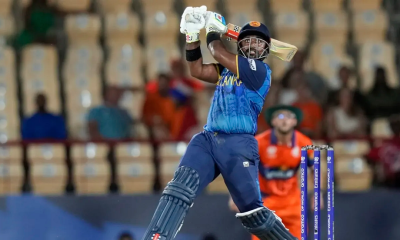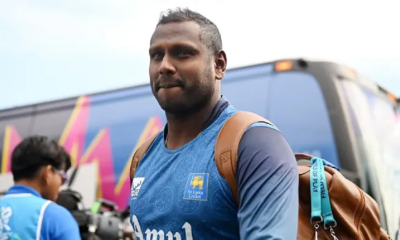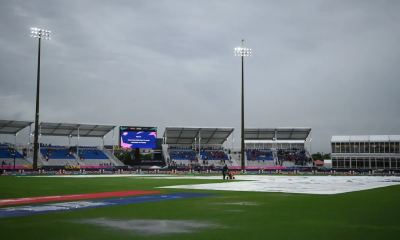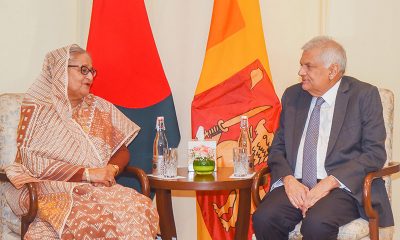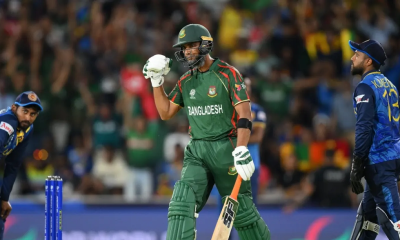Editorial
Tea snapshot

The publication of Merril. J. Fernando’s autobiography last month is a useful peg to hang a discussion on the Ceylon tea industry – we advisedly call it Ceylon tea rather than Sri Lanka tea – as the former is the name by which this unique product is known globally. Merril Fernando, of course, needs no introduction. He is very well known in this country as the creator of the Dilmah brand he coined from the names of his two sons, Dilhan and Malik, which he took to the world outside making it the best known nationally owned tea brand in Sri Lanka. As we said in a review of the book last Sunday, MJF is not the country’s biggest tea exporter but his is the best known nationally-owned brand of Ceylon tea in the tea drinking world.
During the British colonial years and the early post-Independence period, tea was our major export and foreign exchange earner. But decades ago garments overtook tea and also, remittances from blue collar workers striking out overseas to support their families back home became a reckonable factor in the country’s foreign exchange budget. Net earnings from tea, obviously, was far higher than what garments, that had by far become the country’s largest manufacturing industry fairly quickly, brought in. That was because the imported input into tea was a fraction of what the clothing factories had to import to manufacture their product. This included not only fabrics but much more. The labour was the major value adding factor in the domestic garment industry.
The major imported input into the tea industry is fertilizer. Like garments, tea growing too is a labour intensive industry. Onetime Finance Minister Ronnie de Mel who presented 10 national budget for the J.R. Jayewardene regime from 1977 to 1988 once famously said that Sri Lanka’s economy sits on a tripod of women workers – those slaving on the tea fields, working in the garment factories and venturing out as domestic servants largely to the Middle East. Never were truer words spoken. The British brought in indentured Tamil labour from India to work on their tea estates under harsh conditions because the upcountry peasantry was reluctant for various reasons to work on the plantations. These were created at tremendous environmental cost on land sold for a pittance under the infamous Waste Lands Ordinance of 1840.
This stipulated that “all forest, waste, unoccupied or uncultivated land was to be presumed to be the property of the Crown until the contrary is proved.” This resulted in the denuding of the country’s mountain slopes clothed with montane rain forests providing the sponge-like catchments for the rivers flowing through the valleys. The price paid was irreparable ecological damage to first plant coffee and then tea. The upcountry peasantry lost their common grazing land and much more to this despoliation that brought fame and fortune to British plantation owning companies quoted on the London Stock Exchange. Ceylon tea soon earned the reputation of being the world’s best and Merril. J. Fernando in his memorable over six decade long journey through the industry retains at age 92 a passion for the product that was the foundation of his success.
Apart from very readable accounts of his upbringing and early years covered in the book, Fernando has dwelt on the exploitation of Ceylon tea by the British whose chief focus was the bottom line. He writes that during the period of his training as a tea-taster in the UK he was greatly distressed “by the ruthless exploitation of our tea industry and its workers that took place in London.” He had developed a great respect for the British as a result of his friendship with many Brits resident her e as well as his employers who controlled much of the tea export trade. But all that was shaken when he realized what was being done in London to Ceylon tea by the British who dominated the global tea trade in Mincing Lane, “the world’s undisputed tea center controlling and manipulating the distribution and marketing of tea from grower countries.” He says that resulted in producers, especially those in Ceylon, being held to ransom adding that we were then more vulnerable to market manipulation than any other grower as about 90% of national production was being exported, a large proportion going to the UK.
A major service rendered to Ceylon tea by Merril Fernando was his resistance to efforts to make Sri Lanka a so-called ‘tea hub’ by importing cheap teas and blending them with Ceylon tea. This would have been a profitable business but at the cost of both the unique character and reputation of Ceylon tea. In the middle seventies, as result of the JVPs 1971 adventure attributed by the then rulers to land hunger, the land reform laws compelled the sale 150,000 acres of British-owned sterling estates at a price of Rs. 1,125 an acre (pounds 42 and 50 pence). It was agreed that the compensation would be “prompt, effective (meaning may be remitted) and adequate.” Payment was concluded over four years. Rather than alleviate land hunger, the plantations were vested in two monolithic state corporation, the Sri Lanka State Plantations Corporation and the Janatha Estates Development Board.
Despite the presence of 23 Regional Plantation Companies managing state-owned plantations leased to them in 14 regions, 70% of Sri Lanka’s tea is produced by nearly half a million smallholders mostly in the low country. Today the industry is hard-pressed for labour with the tea workers lot way below minimum norms. But the industry remains a vital segment of the Sri Lankan economy.
Editorial
Cushioning tariff shock

Thursday 10th April, 2025
President Anura Kumara Dissanayake’s letter to US President Donald Trump over the US tariff hikes has received much publicity. The NPP government is reportedly sanguine about a positive response from Washington to its request for lower tariff on Sri Lanka’s exports, especially apparels. Hope is said to spring eternal, and there is nothing wrong with being optimistic, but it behoves Sri Lanka to prepare for the worst-case scenario. President Trump’s mind is so elusive that it is not possible to predict his moves, much less guess what he expects the smaller economies to do if they are to qualify for US tariff reductions, if any. He is eyeing mineral resources in Ukraine in return for US military aid to that war-torn nation. Sri Lanka has no such resources to offer. Is the Trump administration trying to pressure it into going out of its way to help further Washington’s geostrategic interests in this part of the world?
China has retaliated by increasing tariffs on imports from the US thereby aggravating global economic uncertainty. Washington says its tariff increases are reciprocal, and therefore the countries affected by them may think they can gain relief by reducing duties on US exports. But the question is whether such action will help the US rectify its massive trade imbalance significantly. The demand for American exports will not increase substantially even if countries like Sri Lanka lower duties thereon, for factors such as cost and quality basically drive demand. Imports from the West, especially input materials, are not in high demand in the developing world because of the availability of cost-effective alternatives.
So, the Trump administration is likely to insist that apparel producing nations like Sri Lanka import commodities such as cotton fabric from the US so as to give a fillip to the American industries. This is what US Ambassador Julie Chung told former Minister Mano Ganeshan at a recent meeting, according to a report we published on 27 March. Such a move is bound to increase the cost of Sri Lankan apparels because US products are very expensive and will adversely affect the competitiveness of Sri Lanka’s apparels in the global market.
President Trump is hopeful that ‘jobs and factories will come roaring back’ because of the tariff hikes at issue, but he does not seem to have factored in the high cost of production in the US and increases in the prices of imports due to high tariff hikes. Tech analysts have pointed out that Apple iPhone prices would soar if they were to be made in the US, and even if the existing supply chains are maintained, their prices will increase substantially. The same may hold true for other commodities, whose prices remain low in the US at present owing to cheap labour and lax environmental laws in the other countries where they are produced.
The countries hit by the US tariff increases have adopted different strategies to cushion the blow from the drastic US action, which has led to a global stock market rout, and sparked protests in the US itself. India is seeking to strike more trade deals with other nations, according to Indian Finance Minister Nirmala Sitharaman, who says such measures have become necessary in view of prevailing global uncertainty. Sri Lanka can learn from how India is trying to mitigate the impact of the US tariff hikes.
Prof. C. A. Saliya, a senior banker turned academic, has pointed out in his latest column, Out of the Box, in this newspaper that if the emerging economies get their act together, they may be able to turn disruptions caused by the isolationist, protectionist, and coercive US trade practices into an opportunity to diversify their exports and trade relations, invest in technology and undertake structural reforms to ensure their economic resilience.
Meanwhile, the formulation of Sri Lanka’s strategy to navigate the new US tariff regime should arise from a tripartite effort if it is to be effective. The government, industrialists and workers should be represented in discussions on the issue. It is high time trade unions shifted their focus from their demand-oriented activism to the pressing need to play a crucial role in protecting the domestic industrial sector. The government should do everything in its power to help industrialists keep costs manageable, ensuring the competitiveness of their products in the global market, and the captains of industry must carry out their export operations in a transparent manner without resorting to sordid practices such as parking most of their export proceeds overseas.
Editorial
Lies, damned lies, and political claims

Wednesday 9th April, 2025
Hardly a day passes in Sri Lanka without the government and the Opposition locking horns and trading allegations of deception, lying and corruption. Deputy Minister of Vocational Education Nalin Hewage, who is at the forefront of the government’s propaganda campaign against the ruling NPP’s political rivals, has caused quite a stir by making a false claim about Sri Lanka’s economic recovery process.
Politicians as well as their mistruths, half-truths and blatant lies are rarely, if ever, out of the news in this country. Politics is generally thought to be a web of deceit, intrigue and lies due to manipulation, horse dealing, dishonesty, power struggles, scandals, corruption and other negative factors it is often associated with.
It may not be fair to paint all politicians with the same brush and label them as liars; there are honourable men and women in politics. However, the general perception is that only the politicians following Machiavelli, who has argued that rulers sometimes have to resort to deception and lying, achieve success in Sri Lanka. This view is not without some merit if our experience with politicians’ claims is anything to go by.
Most Opposition politicians who were lucky enough to survive last year’s Maroon Wave, which swept the NPP to power with a steamroller majority, are lying through their teeth. Denying allegations of corruption against them, they make themselves out to be paragons of virtue, but they won’t account for their wealth. It has now been revealed that the SLPP politicians who lost some of their properties due to mob violence in 2022 falsified the estimates of their losses and obtained compensation far exceeding the actual damages. They also have the audacity to make absurd claims and insult the intelligence of the public. Prior to the 2019 presidential election, the SLPP propagandists claimed that a huge cobra had emerged from the Kelani Ganga and it was a miracle signalling the rise of their candidate to the presidency. When the first Treasury bond scam was committed in early 2015, most UNP parliamentary group members, some of whom are in the SJB at present, told blatant lies in a bid to cover it up.
Deputy Minister Hewage has come under a social media piranha attack, as it were, over his claim at a recent NPP local government election rally in Galle that when the NPP took over the reins of government, last year, Sri Lanka’s foreign reserves had plummeted to USD 20 million, and under the incumbent government they had increased to USD 6.1 billion. Interestingly, disappointed that his claim had not elicited a rapturous applause, Hewage faulted his audience!
Hewage is not alone in claiming that it is the incumbent government that put the economy back on an even keel. Almost all NPP leaders make that claim at political rallies. Besides, they have sought to grab the credit for the completion of some projects previous governments launched, such as the restoration of the Elephant Pass salt factory and the construction of a cold storage facility in Dambulla. What takes the cake is the NPP’s claim that the country has gained nothing since Independence.
It will be interesting to see the NPP’s reaction to Hewage’s claim, which continues to draw heavy criticism on social media. The CID is conducting a probe into SLPP National Organiser and MP Namal Rajapaksa’s law exam results. Going by the absurd claims made by the ruling party politicians, it looks as if the NPP government had to order an investigation into the educational qualifications of some of its own parliamentary group members, especially those who claim to be economic experts.
Editorial
Who will guard the guards?

Tuesday 8th April, 2025
The Opposition has been protesting against what it describes as a veiled threat issued by President Anura Kumara Dissanayake, at a recent NPP Local Government (LG) election rally. The United Republican Front led by former Minister Champika Ranawaka has complained to the Election Commission (EC) that President Dissanayake has made a statement, implying that his government will make financial allocations expeditiously only to the local councils the NPP will win in the upcoming LG polls, and others will find it difficult to obtain state funds.
One can argue that it is not legally possible for a government to deprive the local councils controlled by the Opposition of funds, but threats of fund cuts or restrictions, made by the President himself, could demoralise the people who intend to vote for parties other than the NPP in next month’s LG polls. Political power takes precedence over the law, ethics and morals, in this country, and therefore anything is possible.
In politics, words can be as impactful as actions, shaping public opinion and influencing decisions. One may recall that in 2015, the then President Maithripala Sirisena, as the SLFP leader, queered the pitch for his bete noire, former President Mahinda Rajapaksa, who was contesting that year’s general election as the prime ministerial candidate of the SLFP-led UPFA. In the run-up to that crucial election, Sirisena said in a television interview something to the effect that Rajapaksa would not be appointed Prime Minister even if the UPFA won enough seats to form a government. His statement had a devastating impact on the morale of UPFA supporters who wanted to make Rajapaksa Prime Minister. The rest is history. Besides, former Minister S. B. Dissanayake was sentenced to prison for contempt of the Supreme Court over a derogatory remark he made, at a public rally in 2003, about the judiciary and its rulings.
Meanwhile, there are numerous questionable practices pertaining to Sri Lankan elections. Political leaders in power, such as the President, the Prime Minister and Ministers, conduct election campaigns at a substantial cost to the state coffers, as we have argued over the past so many years. When the Presidents and other government leaders stump for their parties, across the country, the public has to bear the cost of their travel, security, etc. The Presidents and Prime Ministers even travelled in the Air Force helicopters for campaign purposes. The state-owned media outfits are misused as propaganda organs of the party in power although they belong to the people who hold diverse political views. A large number of meetings of state officials are held on some pretext or another, ahead of elections, to give a boost to the ruling party’s campaign. These practices are not only unethical but also tantamount to violations of the election laws, as they place the ruling party at an advantage at the expense of its rivals in elections. All Presidents, namely J. R. Jayewardene, R. Premadasa, D. B. Wijetunga, Chandrika Bandaranaike Kumaratunga, Mahinda Rajapaksa, Maithripala Sirisena, Gotabaya Rajapaksa and Ranil Wickremesinghe unflinchingly used state resources for election campaigns. The public expected a radical departure from the past when they voted the JVP-led NPP into office last year. But what is unfolding on the political front does not offer much hope.
As for presidential statements, it was while speaking at a temple ceremony in the South in 1989 that the then President Premadasa announced his decision to ask India to withdraw the IPKF (Indian Peacekeeping Force) from Sri Lanka. Thus, the Executive Presidents’ statements should not be taken lightly, no matter where they are made.
How can a level playing field be ensured in the upcoming LG polls when the incumbent President himself goes around, issuing a veiled threat that the local councils will face fund cuts or restrictions unless they are controlled by his party––the NPP? It has been revealed in Parliament that at the height of a rice shortage, a few months ago, the NPP government did not supply some popular varieties of rice to the cooperative societies won by its rivals. Such action amounts to collective punishment meted out to the public for defeating the NPP in elections. So, the presidential threat in question, albeit veiled, cannot be dismissed as mere platform rhetoric. The JVP has demonstrated that it is capable of far worse things than fund cuts. The EC therefore must act on the complaints the Opposition has lodged in respect of the presidential statement if it is to arrest the erosion of public trust and confidence in the electoral process. That is also the only way the EC can prevent the public from thinking less of it.
As for President Dissanayake’s statement at issue and the EC’s alleged lukewarm response thereto, Juvenal’s famous question comes to mind: Quis custodiet ipsos custodes? — Who will guard the guards themselves?
-

 Business3 days ago
Business3 days agoColombo Coffee wins coveted management awards
-

 Business5 days ago
Business5 days agoDaraz Sri Lanka ushers in the New Year with 4.4 Avurudu Wasi Pro Max – Sri Lanka’s biggest online Avurudu sale
-

 Features4 days ago
Features4 days agoStarlink in the Global South
-

 Business6 days ago
Business6 days agoStrengthening SDG integration into provincial planning and development process
-

 Business5 days ago
Business5 days agoNew SL Sovereign Bonds win foreign investor confidence
-

 Features1 day ago
Features1 day agoSri Lanka’s Foreign Policy amid Geopolitical Transformations: 1990-2024 – Part III
-

 Features4 days ago
Features4 days agoModi’s Sri Lanka Sojourn
-

 Midweek Review1 day ago
Midweek Review1 day agoInequality is killing the Middle Class


